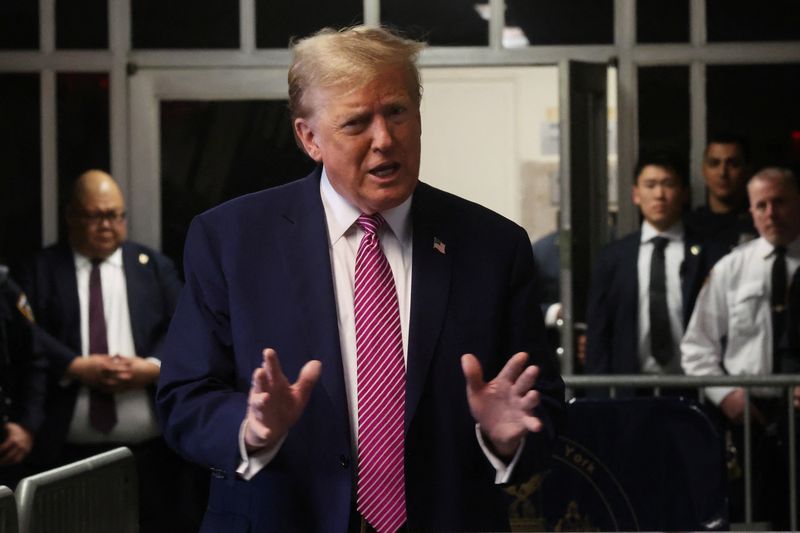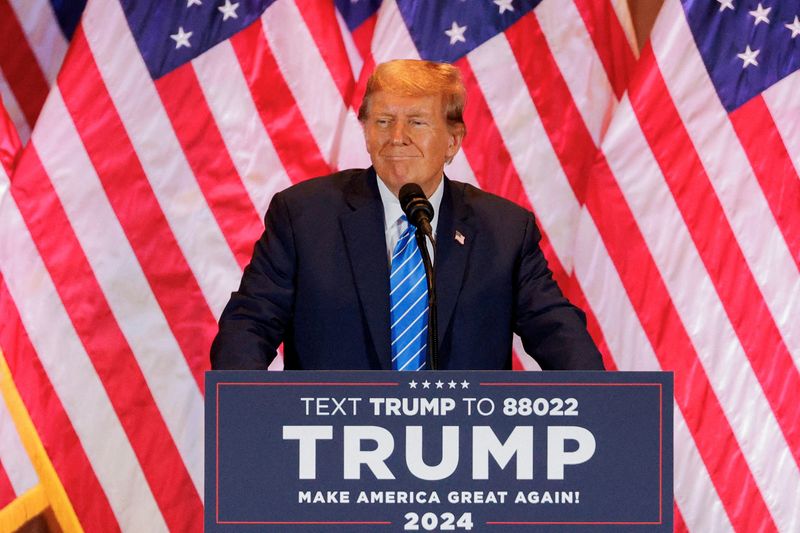By Alexandra Ulmer and Jason Lange
(Reuters) - Republican presidential candidate Donald Trump is using his hush money trial to squeeze his loyal army of small donors and personally lobby major backers as he scrambles to reduce a major fundraising disadvantage with Democratic President Joe Biden.
His campaign has been firing off daily, dramatically worded fundraising appeals to small donors - who rallied to support him when he was first charged in the case last year - since the trial in New York began with jury selection on Monday.
"I could be locked up for life," one email read this week. "I should be campaigning across America and fighting for our country. But instead, I'm stuck in Biden's corrupt court AGAIN," read another, although Trump is being tried in New York state court by the Manhattan district attorney and not by the Biden administration.
He faces up to four years in prison if convicted, although many of those who have been convicted of that crime in the past have faced punishments like probation and fines.
There are early warning signs that Trump's small-donor base may be flagging, suggesting Trump may have to rely more heavily on major donors ahead of the Nov. 5 rematch against Biden.
The biggest fundraising group collecting money for his campaign - known as the Trump Save America Joint Fundraising Committee - reported on Monday that it raised $33.6 million in the first quarter from donors who gave $200 or less.
That was about $17 million less than the amount raised from small donors at the same point in the 2020 election cycle by Trump's main fundraising group at the time, the Trump Make America Great Again Committee, according to a Reuters review of disclosures filed to the Federal Election Commission.
Small donors have historically been crucial funders of Trump's presidential campaigns, and last year they helped Trump raise $13 million in donations in the week after his indictment in the New York case.
But, after initial fundraising spikes off the back of early court appearances last year, donations have slowed as charges accumulated in more cases.
A degree of "Trump fatigue" appears to have set in after nine years of the former real estate tycoon blasting out near-daily overtures for cash, said Zachary Albert, a politics professor at Brandeis University who has studied small donors.
"He's been fairly unscrupulous in his appeals," said Albert. "The norm is to treat these small donors as cash cows that you squeeze as much as you can, as often as you can."
Still, Albert expects an uptick in donations during the trial as the campaign seeks to capitalize on supporters' sentiment that Trump is being unfairly tried.
The Trump campaign did not respond to a request for details on its fundraising strategy. It is due on Saturday to report on its finances through March.
Trump's campaign reported raising $10.9 million February, well below the $21.3 million that Biden's reported raising.
DONOR CALLS, BIG FUNDRAISERS
Given Biden's financial advantage and Trump's spiraling legal costs, Trump is increasingly focused on landing big checks.
The Republican candidate is ratcheting up donor events, placing calls to benefactors on the fence and tapping a money-raising operation that has merged with the Republican National Committee, according to three people briefed on the activity.
"The donors I've needed him to talk to, he's been exceedingly effective in terms of getting large checks and support from them," said one Trump fundraiser, who asked to remain anonymous to share private conversations.
In the last two weeks, Trump has held fundraisers in Georgia and Florida. The campaign aims to raise at least $5 million from each event, although it has settled for less, one of the sources said.
An April 6 fundraiser at hedge fund manager John Paulson's Palm Beach home, which Trump's campaign said raised more than $50 million, attracted heavy-hitter co-hosts including hedge-fund investor Robert Mercer (NASDAQ:MERC) and his daughter and conservative activist Rebekah, investor Scott Bessent, and casino mogul Phil Ruffin.
Some longtime Republican donors remain reticent to back Trump, however, often citing what they see as his erratic personality or the Jan. 6 attack on the U.S. Capitol by his supporters as their main stumbling points.
Several told Reuters they are holding back out of concerns about their donations going to Trump's mushrooming legal fees.
A fundraising group run by Trump has spent more than $55 million on legal bills since the start of 2023. So far, the political contributions paying Trump's legal bills have largely come from small donors.
Another Republican donor said he was comfortable backing Trump again but first wanted to understand what strategy the RNC had to win in battleground states.
One fundraiser said Trump's legal problems, which include four criminal cases, had had the opposite effect on some donors, prompting some to reach for their checkbooks.

"These trials are the catalyst of phone calls," said George Glass, a retired businessman who was Trump's ambassador to Portugal.
In a sign of how the trial is affecting Trump's fundraising outreach, Trump this week called in from New York to Florida to speak during a meeting of the Rockbridge Network, a low-profile but influential group of conservative donors, according to a source.
